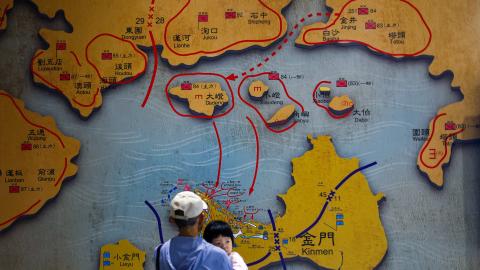Sunday marked the 43rd anniversary of the Aug. 17, 1982, U.S.-China joint communique under the Reagan administration. President Reagan is remembered as the leader who called the Soviet Union an “evil empire” and helped end the Cold War. Still, an often overlooked chapter of his legacy deserves attention today: Reagan’s unshakable insistence that the People’s Republic of China never use force to resolve the Taiwan issue.
In 1982, Reagan drew a line that still defines U.S. policy: America’s relationship with Beijing could not come at the expense of Taiwan’s security, and any reduction in U.S. arms sales would depend absolutely on China’s commitment to peace. That principle remains the permanent imperative of U.S. foreign policy.
The stakes could hardly have been higher. President Carter had normalized relations with Beijing three years earlier, but the most volatile issue, U.S. arms sales to Taiwan, remained unresolved. Beijing thundered that those sales violated its sovereignty and must be ended.
Washington, bound by the Taiwan Relations Act of 1979 and by its moral obligation to defend Taiwan, refused. The dispute threatened to collapse the fragile U.S.-PRC relationship, and negotiations dragged on for eight months.
Beijing pressed for a timetable to terminate arms sales. Reagan would not yield. He made clear that reductions would be made only if China maintained a peaceful approach. “Arms sales will continue … with the full expectation that the approach of the Chinese Government to the resolution of the Taiwan issue will continue to be peaceful,” he declared. That conditionality was not a diplomatic footnote; it was the very heart of America’s position.
In July 1982, Reagan went further still by issuing his “Six Assurances” to Taiwan. They were as blunt as they were historic: no end date for arms sales, no prior consultations with Beijing, no mediation role, no changes to the Taiwan Relations Act, no alteration of America’s sovereignty position and no pressure on Taiwan to negotiate with the PRC.
These assurances were not simply bureaucratic clarifications. They were a covenant of fidelity. For Taipei, they were proof that America’s word could be trusted. For Beijing, they were a message that coercion would not move Washington. For the world, they demonstrated that Reagan’s motto of “Peace Through Strength” applied as much in Asia as in Europe.
On the very day the Aug. 17 communique was signed, Reagan clarified and codified the principle to the key members of his Cabinet that arms sales would be “conditioned absolutely upon the continued commitment of China to the peaceful solution” of cross-strait differences.
He called this linkage “a permanent imperative of U.S. foreign policy.” This was not rhetoric but doctrine. Reagan understood that if America ever decoupled its policy from the principle of peaceful resolution, it would greenlight aggression and shatter Taiwan’s confidence.
By declaring that Taiwan’s defense capability must be calibrated entirely to the PRC’s threat, Reagan embedded deterrence into U.S. strategy. That framework has endured for more than four decades, and it is as relevant now as it was then.
Beijing’s actions today prove Reagan right. The PRC has built a formidable military, deployed thousands of missiles aimed at Taiwan, and engaged in constant military harassment across the strait. Every exercise simulating a blockade, every intrusion into Taiwan’s airspace, every threat from Chinese leaders undermines the peaceful approach Reagan demanded.
From time to time, some in Washington counsel “strategic ambiguity” or concessions to avoid confrontation. That path is precisely what Reagan rejected. He showed that diplomacy with Beijing could coexist with firmness toward Taiwan, but only if America made peace a nonnegotiable condition. To blur that line would be to reward coercion, embolden Beijing and invite catastrophe.
Reagan’s principle is not nostalgia; it is hard strategy. Peace cannot be assumed. Deterrence cannot be optional. America must continue to supply Taiwan with the means to defend itself and make it unmistakably clear that the use of force will never be tolerated.
Reagan’s Taiwan policy was not a balancing act of clever words. It was a moral stand and a strategic necessity. He reminded the world that America could work with China where interests aligned, but never at the cost of acquiescing to force against Taiwan. That is the line he drew in 1982. It is the line America must hold today.
Reagan’s imperative was permanent because it was true: Peace in the Taiwan Strait is nonnegotiable, and coercion must never be rewarded. No use of force, ever. That is the essence of Reagan’s legacy, and it must remain the essence of America’s Taiwan policy.
The duty now falls on President Trump, Congress and leaders of both parties. Uphold Reagan’s doctrine without hesitation or equivocation. The credibility of American power, the survival of Taiwan’s democracy and the peace of the Indo-Pacific depend on it.
Read in The Washington Times.




















